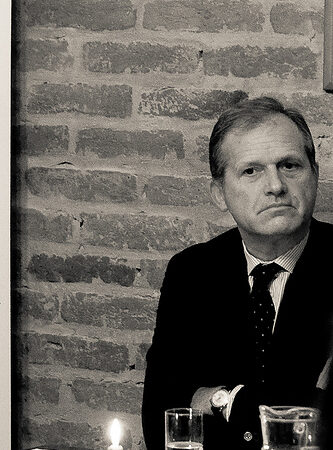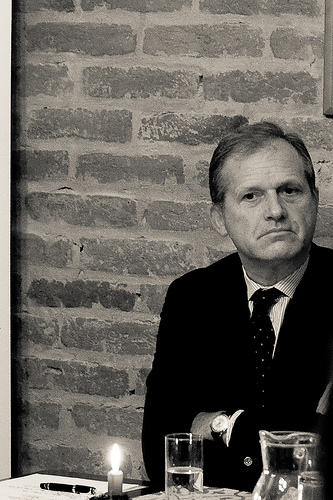What do you do about corrupt MEPs? Openness is vital, but give voters more choice as well

 Since news broke on Sunday that three MEPs – Zoran Thaler, Ernst Strasser and Adrian Severin – were prepared to accept money in return for tabling amendments to legislation, I’ve been trying to work out what conclusions to draw from all of this. You can read more on the ongoing investigations and fallout from Parliament Magazine and the FT, and Reuters has an interesting, more detailed piece on lobbying the EP.
Since news broke on Sunday that three MEPs – Zoran Thaler, Ernst Strasser and Adrian Severin – were prepared to accept money in return for tabling amendments to legislation, I’ve been trying to work out what conclusions to draw from all of this. You can read more on the ongoing investigations and fallout from Parliament Magazine and the FT, and Reuters has an interesting, more detailed piece on lobbying the EP.
It’s clear to me that what the MEPs did was wrong and corrupt, and that they should resign, but as far as I am concerned this is just the start. Alarmingly Severin, as quoted by Parliament Magazine in an earlier article, stated “I didn’t do anything that was, let’s say, illegal or against any normal behaviour we have here” and while he has been kicked out of the S&D Group in the Parliament he still has not resigned.
The sums proposed by the journalists were considerable – Severin sent a bill for €12000, Strasser was talking about an initial instalment of €25000, and the idea was the MEPs would be paid ‘consultancy’ of up to €100000 per year.
Essentially this caught greedy and/or silly MEPs, but what about the rest? The intergroups, the research papers, the events, the dinners? Where is the line between legitimate and illegitimate? When money changes hands? Is €100 different to a bottle of wine worth €100?
In response to this issue, President of the PES, Poul Nyrup Rasmussen said:
This is a question of principles. MEP’s are there to ensure the best legislation for the people of Europe.
To do this they must be seen as beyond financial temptation. Ideally, this should be guaranteed by individual probity, but if rules are needed, so be it. I guarantee that PES will lead the way to ensuring that this situation cannot be repeated.
The rules-based answer alluded to by Rasmussen has been most forcefully advocated by ALTER-EU – you can read their full statement here, and the most important part of it is this:
ALTER-EU said that the European Parliament’s rules governing transparency, ethics, conflicts of interest and relations with lobbyists are currently far too lax and offer little protection against unscrupulous behaviour.
That’s all very well. I would also argue that openness is absolutely vital – outside interests, any sources of income, and lists of who MEPs meet should be regularly published – Reinhard Bütikofer with Bütis Woche is the example to follow.
UK Conservative MEPs have also made a start on this, listing for the 6 months January-June 2010 (why not the rest of 2010 yet?) all the meetings between lobbyists and Conservative MEPs (description here, PDF of the lists here) but the document itself shows the complexity of making a judgment on outside influence. Giles Chichester met 219 lobbyists in this period, mostly from the energy sector, while Robert Atkins and Daniel Hannan did not meet a single one (totals for all Tory MEPs here).
Do Chichester’s 6 meetings with GDF Suez and 5 meetings with RWE show he’s in the pocket of industry, or does that demonstrate he’s a hard-working MEP? Is it good that Hannan and Atkins were not influenced at all by outsiders, or are they actually not doing their jobs, or is it that they simply refused to participate in the whole exercise?
What all of this seems to demonstrate to me is that – beyond openness – trying to make rules to define what is and is not good practice in all of this is like trying to draw a line across a messy patch of grey. This matter is not black and white, rules alone cannot determine what is, and what is not good practice. That is a matter of judgment.
When it comes to judgment of an elected representative, that has to be a choice that’s to be determined by the electorate.
Electorates must have the power – if they have the information – to be able to judge an individual and a party.
Applying this to the UK, if I lived in the South West and wanted to vote Tory and judged Chichester was too cosy with business, were election lists open I could still vote Tory but prioritise another candidate on the list. As the rules currently stand, my only option would be to reject the Tories altogether. That’s precisely why the UK system to elect its MEPs urgently needs to change. The Tories’ list of lobby meetings is useful, but the electorate presently does not have power to judge MEPs on the basis of what the list contains.
In the case of the three MEPs implicated in the scandal, the Romanian system uses closed lists – so voters there have neither the information about who their representatives are meeting, nor the chance to choose among candidates on a list. Both Austria and Slovenia have partially open lists (candidates receiving many preference votes can rise) but voters lack information due to the lack of openness.
So rather than the diversion into transnational lists, the best thing for the cause of European democracy and accountability would be, on the one hand, greater openness about who’s meeting whom, and on the other hand open election lists that would allow voters to judge party and individual. Those are the main lessons to draw from this nasty corruption episode.
If these other countries don’t have an equivalent of the offence of malfeasance in public office, we shouldn’t be sharing legislative institutions with them.
The key point, still missed by everyone, is the journalists/lobbyists approached 60 MEPs and three took the bait. But none of the 60 called the police! The obvious conclusion would seem to be that for the 57, the amounts offered were not sufficient.
Well, I don’t know about the Napoleonic Codes, but in the UK it would be against the law. “Gaining a pecuniary advantage through deception.” trans: making dishonest representations in order to gain money.
I don’t think this is a matter of prosecution or not, as I don’t think they have broken any law or even, as the ALTER-EU statement points out, any internal code of conduct.
The first priority must be to get Severin to resign, and then to look at how the rules can be sorted out.
You mean they have immunity from prosecution? It can only be removed by the parliament? This is a thief’s paradise.
Who is keeping their eye on, Transparency International EU Office and Olaf ?.
We, at the Transparency International EU Office (www.transparencyinternational.eu) are calling for a full official investigation of allegations of MEP’s ‘cash for amendments’ and urge the European Parliament to cooperate fully with the EU and national anti-corruption agencies that are carrying out these investigations.
There are currently investigations underway by the EU’s anti-fraud watchdog, OLAF. National authorities and anti-corruption agencies should also use their powers to investigate, and where appropriate, launch criminal proceedings. Furthermore, in cases where national authorities have the ability to launch investigations or criminal proceedings, the European Parliament should cooperate fully by removing the immunity of the MEPs where requested by the competent authorities.
We are also calling for a robust code of conduct for MEPs that goes beyond the current provisions of the Rules of Procedure of the European Parliament (in particular Art. 9 and Annex I)
It is important that this code of conduct include in particular:
– ethical standards on conflicts of interests
– detailed and up-to-date reporting requirements, e.g. on organisational memberships and direct or indirect financial interests of MEPs
– the obligation to publish a legislative footprint for reports and amendments tabled
– special requirements for MEPs who are selected as rapporteurs and shadow-rapporteurs
The code of conduct should be accompanied with a supervision and enforcement mechanism. Without such credible measures preventing conflicts of interests and corruption at the EU level, institutions such as the Parliament risk the undermining of European democracy and further loss of trust of EU citizens in their work.
Having experience of both DH and R Atkins, I would say the answer is they are both not, shall we say, totally engaged in the work of the EP.
I’m surprised you’re so lenient with these guys. I would have had the police brought in.
It’s a simple question of whether they were acting dishonestly. Plainly they were.